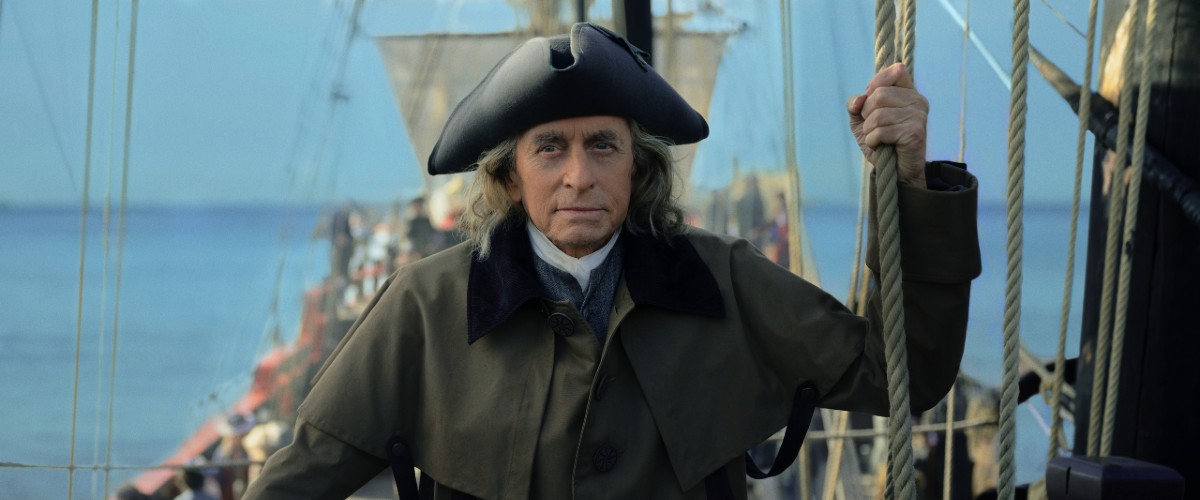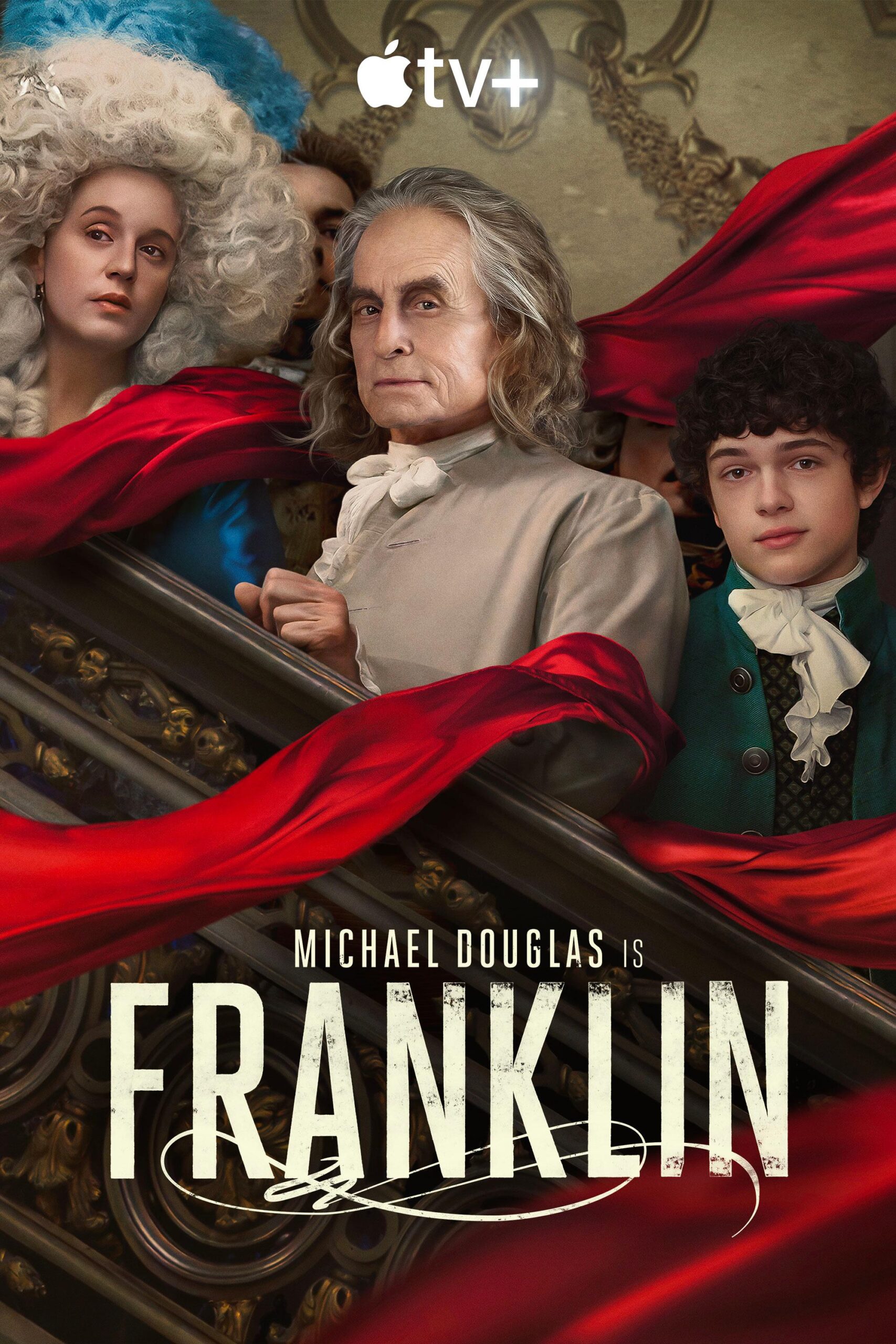You'd be hard-pressed to find a more worthy, time-tested miniseries about America's founding than HBO's "John Adams"—a riveting, elegant chronicle of one of our nation's most famed architects. It's a subject writer Kirk Ellis can't seem to get away from; here, in 2024, he, along with co-writer Howard Korder ("Boardwalk Empire"), zeroes in on another of Adams' contemporaries, Benjamin Franklin, for an eight-episode miniseries on Apple TV+. But where "John Adams" illuminated one of American history's more self-serious advocates for liberty and equality, "Franklin" has a bit of fractured fun with its more libertine protagonist.
It's 1776, and the Revolutionary War is raging; to drum up monetary and logistical support from France, America sends Benjamin Franklin (a wry, taciturn Michael Douglas) across the Atlantic with his teenage grandson and aide Temple (Noah Jupe) in tow. There, the two ingratiate themselves to French society, attempting to work their way through the deeply entrenched barriers that keep them from the purse-string-holders who might unlock the coffers of the French war machine. In the early stretches, "Franklin" sees both American boys engaged in a charm offensive with their hosts, whether it's Benjamin batting eyes at Anne Louise Brillon de Juoy (a radiant Ludivine Sagnier) or Temple cozying up to a group of idealistic revolutionaries (including "On Becoming a God in Central Florida"'s Théodore Pellerin as the charming Gilbert du Motier, who'd soon become the famed Marquis de Lafayette).
However, the more their efforts find purchase within the French aristocracy, the more their problems compound: British spies and representatives quickly enter the negotiation to either stop Franklin entirely or present a suitably attractive offer to the Americans to stop the war in exchange for concessions. What's more, Franklin's own physician, Edward Bancroft (Daniel Mays), juggles his care for Franklin with his work as a double agent for the Brits. That's to say nothing of a mid-negotiation interruption by Franklin's stateside rival, John Adams (Eddie Marsan), whose uptight self-righteousness threatens to derail Franklin's more socially deft handling of the French mood. And as the pair of them and John Joy claw their way to a formally signed treaty with Britain at war's end, their competing perspectives about what America should look like and how it should treat its allies come to loggerheads.
"Franklin"'s see-sawing priorities are made clear in the show's entertaining title sequence, a Pythonesque array of figures drawn from political cartoons of the time showing Franklin in varying states of scandal and intrigue. That's also captured in Tim van Patten's thorough, considered direction; he and cinematographer David Franco lean heavily on natural light and desaturated blues to craft a France still clinging to ostentatiousness even as its own cruddiness becomes clear (see: the frequent reveals of characters pissing against stone walls of ornate architecture). Jay Wadley's score effortlessly balances the classical stuffiness of 18th-century France with modern scoring techniques that sell the show's frequent dips into political thriller mode.
As Franklin, Douglas is an entertainingly droll figure; he balances the presumed historical wit of the real Franklin with a decidedly Douglas-ian twinkle in his eye. He's grandfatherly with Temple, but no less a hedonist than someone like Gordon Gekko—he plays Franklin as if one of his erotic-thriller protagonists from "Basic Instinct" or "Fatal Attraction" got zapped back in time and slapped on a powdered wig. He's wizened but no less amorous for his advanced years, the kind of aging playboy that fits in nicely with the pre-French Revolution decadence around him. Douglas handles the dry wit of Ellis and Korder's script with a nimbleness belying his years, even as Franklin's own health threatens to leave him bedridden for much of the latter stages.
While he plays well against his co-stars, especially his paternal guidance of Jupe's Temple, he comes most alive when sniping with Adams, who appears halfway through the series as if he were Nick Fury about to rope Ben into the Founders Initiative. Marsan's energy as Adams is decidedly different from Giamatti's in Ellis' original 2008 miniseries—"Franklin" feels like a series-long extension of that series' third episode, which depicted a more truncated version of these events—but no less welcome. He's a haughtier, more confrontational balm to Franklin's frivolity, a junior statesman who hasn't yet figured out how to play the game. (His private attempts to speak and memorize French are some of the show's more archly funny moments.)
The show stumbles more when focusing on Temple, though Jupe plays the role with an admirable, youthful pluck. Where Franklin struggles to carve out a legacy in his final years, Temple comes of age, losing himself in the frippery and bustle of French life. He falls in love with an opera singer, gets involved in love triangles, and even finds a job as a page rushing letters across Paris at speed. While these subplots could carry a show on their own, they pale in comparison with the heftier statecraft of Douglas' sections; in a show already stretching past eight hours, they often feel like distractions, and don't sufficiently contrast Ben Franklin's more sophisticated statecraft to make them feel worth the runtime.
As historical dramas go, "Franklin" is a cracking glimpse at the delicate works required to build a republic, even from an ocean away. After all, America's freedom from Britain was won by more than muskets on the battlefields of Lexington and Concord; it took gumption, charm, and no small amount of promise-making, whether real or illusory, to our allies. What Van Patten and his crew accomplish is the feeling of a new nation being forged in the waning embers of an old empire and the cautious optimism all parties feel toward that potential.
Whole series screened for review. Franklin begins streaming on Apple TV+ April 12.




















